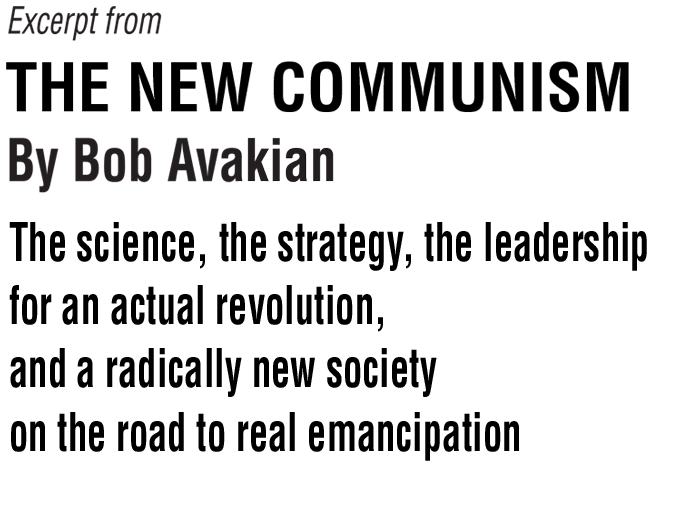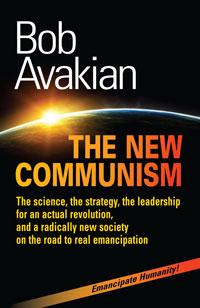
The following is an excerpt from the work by Bob Avakian, The New Communism. In addition to this and other excerpts posted on revcom.us, we will be running further excerpts from time to time on revcom.us. These excerpts should serve as encouragement and inspiration for people to get into the work as a whole, which is available as a book from Insight Press and as a PDF online at revcom.us.


This excerpt comes from the section titled "IV. The Leadership We Need."
This puts in the proper perspective the absolute necessity, and the crucial role, of a revolutionary communist vanguard party. At the same time, we do need to clearly recognize and confront the contradictions bound up with this. I touched on this somewhat before, but I want to come back to it and go into it from some different angles. In Ruminations and Wranglings, I examined the role of intellectuals as a leading core of the Party and the revolution—the political and literary representatives of the proletariat, in the fundamental sense—and the contradictions involved with this. I pointed out that this applies, regardless of where the people come from who make up this leading core, as intellectuals. Whatever their background is, the same basic contradictions apply.
To put it very simply, what do I mean by intellectuals? Not necessarily somebody with a Ph.D. or some specialized formal education. I mean people who have developed the ability to work with ideas and grapple with theory systematically, if not always correctly. Now, let me get into that “if not always correctly” point a little bit. It’s not just a matter of reading and studying theory. It’s a matter of correctly dealing with theory in relation to the real world, and going back and forth between theory and the practice of implementing that theory to change the world, and drawing the lessons from that, as well as drawing lessons from life more broadly. If you set out, like the forces in El Salvador, or Angola, or Cuba, on the wrong basis, you will draw the wrong lessons and your theory will not be in accord with actual reality and the way it needs to be transformed in order to emancipate people. I think of what Mao said one time about the big socialist of Lenin’s time, Kautsky. He was a reformist socialist, but he was the big shot in the socialist movement in Lenin’s time, until the Russian revolution. The party headed by Kautsky in Germany was the biggest socialist party in the world: it had millions of supporters, it had seats in the Parliament of Germany, it had leading positions in a lot of trade unions. Well, in his typically provocative “Maoesque” way, Mao said: Reading and studying theory is important, but it’s not just a matter of reading. With people like Kautsky, the more they read, the stupider they get.
This gets to a very basic point: What method and approach are you applying when you’re grappling with theory? Is it scientific, or is it some other kind of method and approach?
It’s worth getting into this further here. Spontaneously, among the masses of people, there is both a lot of respect, even exaggerated respect, for intellectuals, and a lot of resentment toward them, at one and the same time. But, given where we are, right now, in the actual development of human society—not in any sense of how things were bound to go, but where things have actually developed to—it’s a simple fact that the leading core of the revolution that is needed is going to be, of necessity, people who have developed intellectual skills and abilities. You cannot lead a revolution just on revenge—we’re back to the Ajith polemic—you cannot just go on simple class feelings, just on a hatred for oppression, or a sense of resentment toward those a little better off. And you cannot do it with an anti-intellectual attitude. The theory that we need to lead this revolution has to deal with very complex reality, and it takes work and struggle to develop the ability to grapple with theory on that level. Now, again, this applies regardless of where the people come from who make up the leading core. We know of the phenomenon of people who come out of very hard conditions who, for a combination of reasons, have been able to develop into advanced intellectuals. We’ve cited the example of our comrade, whom we lost, Wayne Webb (Clyde Young), who came out of prison—he didn’t come out of a university with the privilege of having a highly developed education there, he came out of a hard life and out of prison, but he turned himself into a prison intellectual, and into a revolutionary and a communist. That was a great thing, a very inspiring thing, but it’s not an exceptional thing. Well, it’s exceptional in one sense, but it’s not exceptional in the sense that only one or two people can do that. But, again, it takes work. It’s very hard to develop yourself as an intellectual in prison—that should be obvious. The conditions are not very conducive to that, to say the least. There’s a lot pushing in the opposite direction. So, to fight through and do that is a real achievement—and especially to do it for the emancipation of humanity is something very precious—but it’s not something that only one or a few people can do. In fact, others have done or are doing this, and we need many more people to do it.
But it is also necessary to understand that, once you do that, you are different than you were before. It doesn’t mean that you’ve forgotten everything you’ve learned through your life experience, or that you’ve turned into some kind of intellectual snob—unless you have. That’s been known to happen, too. But, in any case, you still have all that life experience, yet you’re not the same. And, mainly, that’s a positive thing: You’ve become an emancipator of humanity, you’ve become a revolutionary intellectual, capable of grappling with these complex ideas, and leading other people to do so. But, whether you come out of prison, wherever you come from (I sound like Peter Tosh now: “don’t care where you come from”... but anyway) whether you come out of prison, whether you come out of the housing projects, whether you come from somewhere on the border of Mexico, or from Mexico, or from Guatemala, or whether you are a South Asian refugee—whatever background you have and wherever you come from—if you develop these skills and abilities, you are different than you were before. You have become an intellectual—and that’s not a dirty word. Wherever they come from, intellectuals who actually take up the cause of the emancipation of humanity, and the communist outlook and method that’s necessary to lead to that emancipation, are tremendously precious. We should never have a narrow-minded philistine attitude of looking down on, devaluing and denigrating, intellectual development, or people who have that development, unless they’re using it for purposes that are against the interests of the masses of people. And even then, we should struggle with them, at least for awhile, to see if we can win them away from that. But we should have a real, scientific appreciation for the importance of intellectual development. We should nurture it and develop it among people from everywhere.
At the same time, there are real contradictions bound up with this. You have to deal in the realm of ideas and a lot of theoretical abstraction in order to be able to develop line and policy to lead the revolution, in order to deal with all the complex contradictions that I’ve been talking about and that we confront out there in the world, so to speak. And, when you get into the position of having those abilities and skills, and dealing on that level with the realm of ideas, there is a pull away from what it needs to be put to the service of. It is a very strong pull, if you think about what I said earlier—living in a society where you’re constantly told that “self ” is the most important thing and whatever skills you develop you should use for yourself, first and above all. It’s a pull on everybody. It’s not just people who have a fancy education, in a formal sense—a university degree or a Ph.D., or whatever. There is a crucial role for communist intellectuals and communist statesmen, if you want to use that term, in actually developing the struggle that can lead to the revolution we need. You need to be able to deal not only with contradictions in the abstract—at a high level of theoretical abstraction—you also need to be able to deal with people, and the contradictions as they express themselves in and through real live people. The process of revolution is not a process of turning on a machine. Revolution is made by people. To deal with all this takes solid core and elasticity. It takes firmness and flexibility (or, with regard to flexibility, what is described by the French word souplesse) to be able to handle these things in a way that’s neither giving up on the whole thing nor, on the other hand, rigid and inflexible, dogmatic and doctrinaire.
Contents
Publisher's Note
Introduction and Orientation
Foolish Victims of Deceit, and Self-Deceit
Part I. Method and Approach, Communism as a Science
Materialism vs. Idealism
Dialectical Materialism
Through Which Mode of Production
The Basic Contradictions and Dynamics of Capitalism
The New Synthesis of Communism
The Basis for Revolution
Epistemology and Morality, Objective Truth and Relativist Nonsense
Self and a “Consumerist” Approach to Ideas
What Is Your Life Going to Be About?—Raising People’s SightsPart II. Socialism and the Advance to Communism:
A Radically Different Way the World Could Be, A Road to Real EmancipationThe “4 Alls”
Beyond the Narrow Horizon of Bourgeois Right
Socialism as an Economic System and a Political System—And a Transition to Communism
Internationalism
Abundance, Revolution, and the Advance to Communism—A Dialectical Materialist Understanding
The Importance of the “Parachute Point”—Even Now, and Even More With An Actual Revolution
The Constitution for the New Socialist Republic in North America—
Solid Core with a Lot of Elasticity on the Basis of the Solid Core
Emancipators of HumanityPart III. The Strategic Approach to An Actual Revolution
One Overall Strategic Approach
Hastening While Awaiting
Forces For Revolution
Separation of the Communist Movement from the Labor Movement, Driving Forces for Revolution
National Liberation and Proletarian Revolution
The Strategic Importance of the Struggle for the Emancipation of Women
The United Front under the Leadership of the Proletariat
Youth, Students and the Intelligentsia
Struggling Against Petit Bourgeois Modes of Thinking, While Maintaining the Correct Strategic Orientation
The “Two Maximizings”
The “5 Stops”
The Two Mainstays
Returning to "On the Possibility of Revolution"
Internationalism—Revolutionary Defeatism
Internationalism and an International Dimension
Internationalism—Bringing Forward Another Way
Popularizing the Strategy
Fundamental OrientationPart IV. The Leadership We Need
The Decisive Role of Leadership
A Leading Core of Intellectuals—and the Contradictions Bound Up with This
Another Kind of “Pyramid”
The Cultural Revolution Within the RCP
The Need for Communists to Be Communists
A Fundamentally Antagonistic Relation—and the Crucial Implications of That
Strengthening the Party—Qualitatively as well as Quantitatively
Forms of Revolutionary Organization, and the “Ohio”
Statesmen, and Strategic Commanders
Methods of Leadership, the Science and the “Art” of Leadership
Working Back from “On the Possibility”—
Another Application of “Solid Core with a Lot of Elasticity on the Basis of the Solid Core”Appendix 1:
The New Synthesis of Communism:
Fundamental Orientation, Method and Approach,
and Core Elements—An Outline
by Bob AvakianAppendix 2:
Framework and Guidelines for Study and DiscussionNotes
Selected List of Works Cited
About the Author